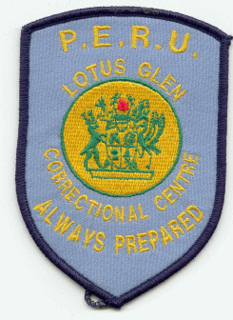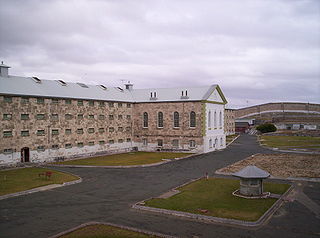Related Research Articles

Lotus Glen Correctional Centre is an Australian prison facility located 14 km south of Mareeba and 20 km north of Atherton in the locality of Arriga in Far North Queensland. Lotus Glen provides a correctional service for high, medium, low and open classification inmates, including a Prison Farm with a capacity for 115 "open security" inmates.
Reconciliation Australia is a non-government, not-for-profit foundation established in January 2001 to promote a continuing national focus for reconciliation between Indigenous and non-Indigenous Australians. It was established by the Council for Aboriginal Reconciliation, which was established to create a framework for furthering a government policy of reconciliation in Australia.

Aboriginal Australians are the various Indigenous peoples of the Australian mainland and many of its islands, such as Tasmania, Fraser Island, Hinchinbrook Island, the Tiwi Islands, and Groote Eylandt, but excluding the Torres Strait Islands. The term Indigenous Australians refers to Aboriginal Australians and Torres Strait Islanders collectively. It is generally used when both groups are included in the topic being addressed. Torres Strait Islanders are ethnically and culturally distinct, despite extensive cultural exchange with some of the Aboriginal groups. The Torres Strait Islands are mostly part of Queensland but have a separate governmental status.

Aboriginal deaths in custody is a political and social issue in Australia. It rose in prominence in the early 1980s, with Aboriginal activists campaigning following the death of 16-year-old John Peter Pat in 1983. Subsequent deaths in custody, considered suspicious by families of the deceased, culminated in the 1987 Royal Commission into Aboriginal Deaths in Custody (RCIADIC).
The National Indigenous Times is an Indigenous Australian affairs website first published in newspaper form on 27 February 2002. Since late February 2016, it has functioned as an online publication owned by Indigenous businessman and former Kimberley Land Council CEO Wayne Bergmann and Indigenous businessman Clinton Wolf. It was formerly owned and edited by Tony Barrass. The current editor is Hannah Cross.
Indigenous Australian seasons are differently classified than the traditional four-season calendar used by most western European peoples. Aboriginal Australians and Torres Strait Islander people have distinct ways of dividing the year up. Naming and understanding of seasons differed between groups of Aboriginal peoples, and depending on where in Australia the group lives.

National Indigenous Television (NITV) is an Australian free-to-air television channel that broadcasts programming produced and presented largely by Aboriginal and Torres Strait Islander people. It includes the half-hourly nightly NITV News, with programming including other news and current affairs programmes, sports coverage, entertainment for children and adults, films and documentaries covering a range of topics. Its primary audience is Indigenous Australians, but many non-Indigenous people tune in to learn more about the history of and issues affecting the country's First Nations peoples.
The age of criminal responsibility in Australia is the age below which a child is deemed incapable of having committed a criminal offence. In legal terms, it is referred to as a defence of infancy. All states and self-governing territories of Australia have adopted 10 years of age as a uniform age of criminal responsibility. Concerns have been raised about the effects of criminalisation of such young children, and in particular the effects on Aboriginal Australians and Torres Strait Islander people, who are disproportionately represented in the statistics, often reflecting as well as increasing a cycle of disadvantage.
The 2010 Deadly Awards were hosted by Luke Carroll and Naomi Wenitong at the Sydney Opera House on 27 September 2010. Performers included Archie Roach, Dan Sultan, Christine Anu, Frank Yamma, Ali Mills and the Bangarra Dance Theatre. The Awards program will be broadcast on SBS and SBS Two on 3 and 6 October respectively. The awards event was an annual celebration of Australian Aboriginal and Torres Strait Islander achievement in music, sport, entertainment and community.
Indigenous Australians are both convicted of crimes and imprisoned at a disproportionately higher rate in Australia, as well as being over-represented as victims of crime. The issue is a complex one, to which federal and state governments, as well as Indigenous groups, have responded with various analyses and numerous programs and measures. As of September 2019, Aboriginal and Torres Strait Islander prisoners represented 28% of the total adult prisoner population, while accounting for 2% of the general adult population.

Punishment in Australia arises when an individual has been convicted of breaking the law through the Australian criminal justice system. Australia uses prisons, as well as community corrections. The death penalty has been abolished, and corporal punishment is no longer used. Prison labour occurs in Australia, prisoners are involved in many types of work with some paid as little as $0.82 per hour. Before the colonisation of Australia by Europeans, Indigenous Australians had their own traditional punishments, some of which are still practised. The most severe punishment by law which can be imposed in Australia is life imprisonment. In the most extreme cases of murder, courts in the states and territories can impose life imprisonment without parole, thus ordering the convicted person to spend the rest of their lives in prison.
Indigenous land rights in Australia, also known as Aboriginal land rights in Australia, relate to the rights and interests in land of Aboriginal and Torres Strait Islander people in Australia, and the term may also include the struggle for those rights. Connection to the land and waters is vital in Australian Aboriginal culture and to that of Torres Strait Islander people, and there has been a long battle to gain legal and moral recognition of ownership of the lands and waters occupied by the many peoples prior to colonisation of Australia starting in 1788, and the annexation of the Torres Strait Islands by the colony of Queensland in the 1870s.
The 2011 Deadly Awards were hosted by Aaron Pedersen and Casey Donovan at the Sydney Opera House on 27 September 2011. Shellie Morris, the Yanyuwa Singers and the Gondwana National Indigenous Children's Choir all performed at the ceremony. The Awards program were broadcast on nationally on SBS TV in October. The event was an annual celebration of Australian Aboriginal and Torres Strait Islander achievement in music, sport, entertainment and community.
Sandra Eades is a Noongar physician, researcher and professor, and the first Aboriginal medical practitioner to be awarded a Doctorate of Philosophy in 2003. As of March 2020 she is Dean of Medicine at Curtin University.
Indigenous health in Australia examines health and wellbeing indicators of Indigenous Australians compared with the rest of the population. Statistics indicate that Aboriginal Australians and Torres Strait Islanders are much less healthy than other Australians. Various government strategies have been put into place to try to remediate the problem; there has been some improvement in several areas, but statistics between Indigenous Australians and the rest of the Australian population still show unacceptable levels of difference.
First Contact is an Australian reality television documentary series that aired on SBS One, SBS Two and NITV. It documents the journey of six European Australians who are challenged over a period of 28 days about their pre-existing perceptions of Indigenous Australians.
Gerry Georgatos, born in 1962, is a university researcher and academic and a social justice and human rights campaigner, who has campaigned for prison reform, as well as championing the rights of the impoverished and marginalised and the homeless.

The National Indigenous Human Rights Awards is an annual Australian awards ceremony that recognises the contribution of Indigenous Australians to human rights and social justice. It is the first national Australian award ceremony dedicated solely to Indigenous human rights achievements.
The Closing the Gap framework is an Australian government strategy that aims to reduce disadvantage among Aboriginal and Torres Strait Islander people, based on seven targets. From adoption in 2008, after meetings with the Close the Gap social justice campaign, until 2018, the federal and state and territory governments worked together via the Council of Australian Governments (COAG) on the framework, with the Department of the Prime Minister and Cabinet producing a report at the end of each year analysing progress on each of its seven targets.
The First Nations Deaths In Custody Watch Committee was first registered on 7 January 2015, but its first annual report under that name was for 2017. It is the successor to the Deaths In Custody Watch Committee (WA), which was a social justice organisation operating from Perth, Western Australia from 1996 until it underwent a constitutional change early 2017. It is a Public Benevolent Institution whose main concern is Aboriginal Australian deaths in custody.
References
- ↑ Cousins, Sophie (20 January 2017). "Suicide in Indigenous Australians: a 'catastrophic crisis'". The Lancet. 389 (10066): 242. doi:10.1016/S0140-6736(17)30137-X. PMID 28118906. S2CID 9427645.
- ↑ Georgatos, Gerry (17 February 2016). "Risk of death high after release from prison" (1719). Guardian Australia.
- ↑ Arnold, Rhiannon (24 May 2016). "When suicide becomes normal". Western Independent. Curtin University.
- ↑ Georgatos, Gerry (10 March 2017). "New leadership needed to reduce incarceration". SBS. SBS Australia.
- ↑ Sainty, Lane (29 May 2019). "After his brother died from suicide, this man started a program to get ex-prisoners into work". Buzzfeed. Buzzfeed.
- ↑ Blackwell, Eoin (8 August 2017). "How This Program For Former Prisoners Is Completely Changing Lives". HuffPost. HuffPost.